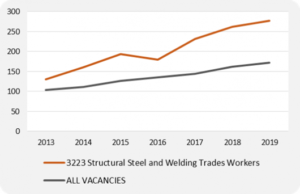
Welding is a vital field of work in New Zealand. Due to the nature of being a country rapidly developing in all fields, it requires the construction of new infrastructure projects, manufacturing projects, shipbuilding, aerospace, automotive industries, and oil and gas industries, among a growing list of others. All of these fields include many welding-related jobs, so be sure that you will find both your goal and a suitable opportunity in welding.
As per the jurisdictions of New Zealand, you can’t start working as a welder until you at least complete an apprenticeship and gain a New Zealand Certificate in Engineering – Fabrication (Level 3) and register in Engineering – Fabrication (Level 4).
Here below are the few steps you can take after completing your welding certification:
You can do this by surfing the internet and reading daily newspapers focused on advertising open job opportunities. There are common sites for advertising open opportunities in New Zealand, including Trade me, Seek, and the Ministry of Innovation & Business Employment:
Trade Me Jobs: www.trademe.co.nz/jobs
Seek: www.seek.co.nz
MBIE: https://www.mbie.govt.nz/
Many work areas offer welding opportunities, including construction, shipbuilding, boiler making, sheet metal works, automotive industries, repair and maintenance work, etc. Many people are interested in certain areas of work, so they chase these opportunities first and then try for other areas with welding jobs.
These statistics will help you get a general view of the areas that offer a lot of work in welding, so you will be able to find a job more easily.

The chart shows the structural steel and welding trades have been advertised increasingly since 2013.
It’s better to have your place of work close to home, so start searching for all open opportunities around you to have a good balance between work and home.
If you are not interested in working as an employee in any company, you can decide to start your own business as a small workshop in your area. It’s better to be specialised in a certain area of work as specialised welders are preferred over all-rounder welders by companies. These specialisations, for example, include piping works, repairs and maintenance, and so on.
Whatever you decide to do, have confidence in the fact that you are now a qualified welder, and thus, you can explore opportunities that you feel the best fit you and your goals.